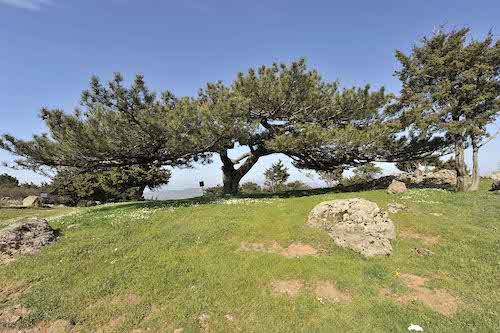(Black Pine at the Profetis Illias)
About a fifth of Lesvos is covered with forests and a full quarter is occupied by olive trees. The most famous forest is of course one that doesn’t exist anymore: the petrified forest that stretches over a large part of the west of the island. Possibly the island was once totally covered by forests; it even housed giant sequoias. But they are no longer to be found in the woods of today. The forests consist mostly of fir, oak and chestnut trees.
Scientists are especially interested in the black pine (Pinus nigra), a species now threatened in Europe. They are very much wanted by the pharmaceutical industry. On Lesvos, these trees grow mainly on the slopes of Mount Olympus and Mount Profetis Illias in the west. The black pines on Olympus are threatened by another species, the Turkish pine (Pinus Brutia), making their community shrink by the day. The black pines on the Profetis Illias have no enemy, so they only have to fear the inevitable wild fires.
The waving tree tops in the woods give magical wind concerts and whisper plenty of stories. Between the trees tortuous paths lead up and down mountains and hills and give plenty of opportunity to get lost. For centuries the woods were a safe haven for fleeing people. Like in the 8th century, when Agathon from Jerusalem wanted to surprise Irene of Byzantium (who had been banished to Lesvos) with an icon of Mary, painted by the apostle Lucas. When Agathon arrived on the island, Irene had just died and Agathon had to find a safe place for his treasure. He hid in the woody area around Olympus, creating a small settlement that later became the now so idyllic village of Agiasos.
During the Second World War resistance fighters fled into the woods between Parakila and Pterounda, close to a small, hidden church of Maria: Panayia Krifti, just a little below one of the many paths that slowly creep towards the top of the Profetis Ilias. In April/May these woods also hide the sweet scented rhododendrons, that stream like bright yellow rivers between the dark trees: the only place you can find them in Europe. The beautiful summit of the Profetis Ilias also surprises with a monumental old black pine tree, staring dreamingly over the magnificent views.
During the Greek civil war it had been the communists that went into the woods. So it can happen that when roaming deep into the forest you can bump into a memorial plaque in memory of a hero. Like captain Dimitris Pitaoulis, who died in December 1947 in the woods close to Megali Limni (although he was shot by a bullet from his own rifle).
In those central woody regions there even used to be nomads who made their living from logging and wood carving. Inhabitants from villages like Ambeliko went into the woods in order to collect resin, they slept in primitive huts and only went home on the weekends.
So the woods of Lesvos bear plenty of traces of a lively history: old shacks where once the resin workers slept, rusty tubs spiked into the trees for collecting resin, a ruin of a kafenion in the middle of nowhere, the remains of a funicular used to transport the resin towards the Gulf of Kalloni, mysterious caves where who knows who has been hiding, lonely chapels, proud little churches and faded memorial plaques.
And history continues. In April a new refugee centre is planned to open its doors, just a little above the Taurus plateau (above Pigi and Komi), a protected nature reserve, with high risks of wild fires. Now it is the state that brings people to the Lesbian forests to hide them. Seeing the plans it is clear that this is not going to be a camp, but more a prison with watchtowers and all other kinds of fancy monitoring equipment.
And even if it were to be an open camp, I do not believe that the refugees will be happy with those quiet and lonely surroundings of whispering trees, nor the edible mushrooms in Autumn or the coloured flowers in Spring. As if they fled to Lesvos to relive Walden* (by Henry David Thoreau)! The closest village is many kilometers away, the city for sure too far to be reached by foot. These people won’t be thankful for the trees that make them invisible. How sick Europe has become to let this happen!
*Walden is a famous book from 1854, about a two years stay of the writer Henry David Thoreau, surviving in a simple shack in the middle of woods in America.











